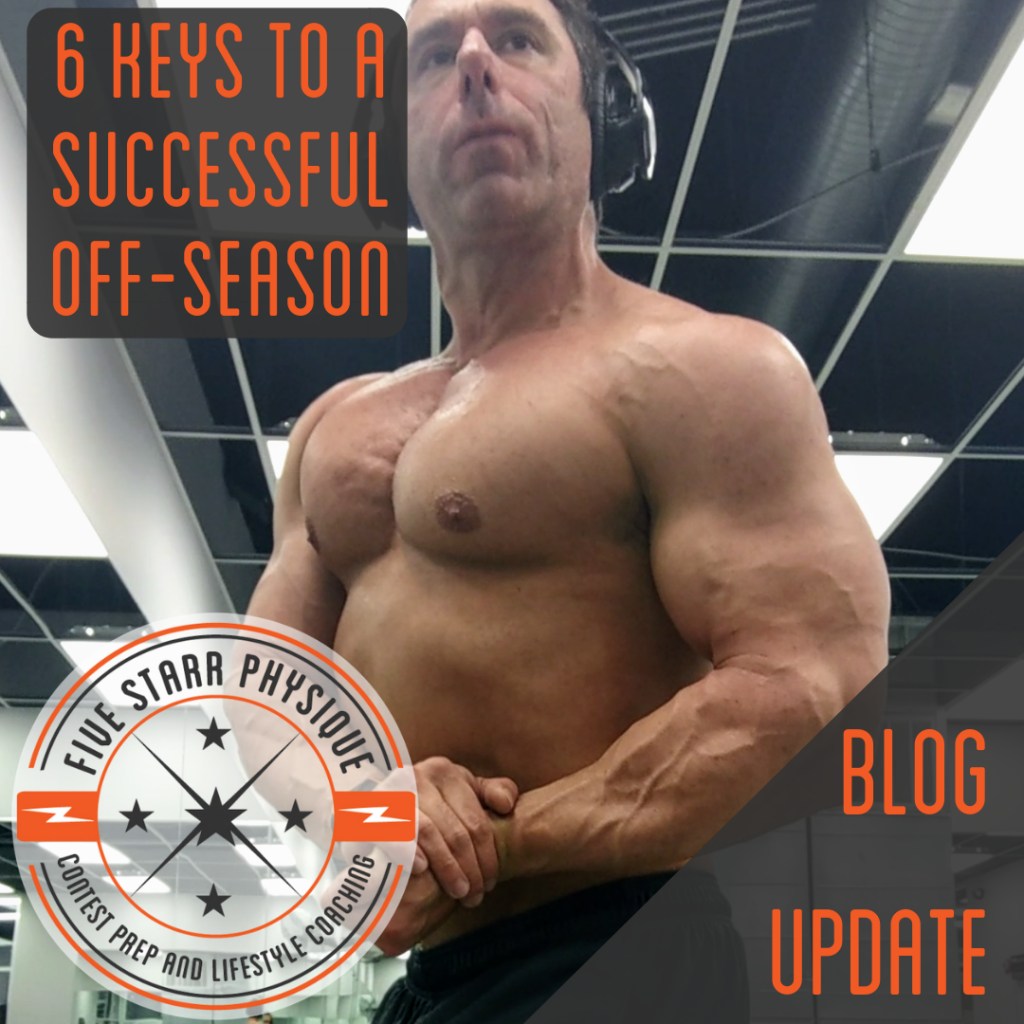Six Keys to a Successful Off-season
[DISPLAY_ULTIMATE_SOCIAL_ICONS]
Back in episode 81 of my podcast (which you are already listening to, right? If not, click here and redeem yourself – I’ll never know!) my guest was IFBB figure pro Kim Helm and she said something that I couldn’t possibly agree with any more.
How your off-season goes determines how your prep goes
There’s a lot being said in that statement beyond just what you might read at first glance. The obvious: the more focused, goal-oriented, driven, and precise you are during your off-season, the more direct carryover you will see into your next pre-contest cut. The harder you hit the off-season, the more muscle growth you can achieve, the leaner you can remain (if that’s part of your goal – not necessarily ideal for everyone), and the more change in your physique you will realize at the end of your next cut.
The less obvious, implied statement there is even more critical: if you don’t have a solid off-season, you’re basically just having consecutive preps with dead space in between. And THAT is a great recipe to look exactly the same from one show to the next.
Since you’re at a caloric deficit during prep, your chances of building any muscle are pretty slim, meaning that the off-season is your chance!
Off-season vs. just “off”
Too many people fall into a pattern that looks like this:
- Prep for 14-18 weeks
- Compete, do a photoshoot, whatever
- Binge eat, rebound
- Believe you are now fat again
- Return to step 1 as a corrective measure
The issues here are numerous, not the least of which is probably taking a big step towards giving yourself an eating disorder. It SO easy to see yourself as being lean and then having a really hard time letting it go – but realistically, you’ve got to. For most of us, it’s not something that’s sustainable, at least not while maintaining any quality of life at all. The way our bodies work, it becomes very natural – and I’d say appropriate – to turn this into something cyclical.
So after a prep, we then turn around and focus on growth. This gives your body a chance to work in some additional calories and remember how to process those, take a break from LOADS of cardio, and enjoy improved performance in the gym due to less overall fatigue which will make building muscle a lot easier.
So with that as a prelude, let’s look at a few key factors that go into making a successful off-season
#1 – How long should it be?
Muscle growth is a slow process, even when done right. You’ve got to give yourself time to grow, patience to let it happen, and remain focused so that you don’t fall into the trap of getting bored and then say “crap I need to pick another show” – commit to a certain duration, plan it out with your coach if you have one, and then see it through. If you’re already competing at a high level, take the time to look at your pics and look at your competition. See where your strengths lie and be honest about your weaknesses. Think about how long you need to turn your weaknesses into your strengths.
Is there any rush to get back on stage? Typically, no – so take the time necessary to let your body really change. For some people, this is a number of months. For others, it may be a year or two. Be realistic. To be clear, 6 weeks isn’t a growth phase – that’s just a moderate gap between shows.
#2 – Focus on performance, not the scale
I do like to monitor weigh-ins for clients during a growth phase, but it’s not our main focus. It’s a good indicator if things are getting out of hand and if the diet is really getting sloppy, but photos and your mood will tell you that as well. But if that number climbs, you still feel reasonably comfortable and tight, and your performance continues to improve? That’s what it’s all about right there!
And by performance I’m not talking exclusively about weight – but additional reps, overall level of aggression, mind/muscle connection, pump, fatigue, and overall output. Don’t get overly fixated on moving poundage but on “performance” as a more broad concept.
#3 – Live a little
I encourage my clients to be fairly precise during the off-season, but I’m also not going to bust their balls if they have an extra cheat meal or go out drinking one night or anything like that. Let’s be clear: this is the time as a bodybuilder when you can do this shit and get away with it. It doesn’t fly AT ALL pre-contest, but if you’re putting in some very solid work in the off-season, your body will whether a little extra discretionary input.
It’s also important to achieve some life balance, especially if you have a spouse or significant other that is NOT all about that bodybuilding lifestyle. Take a vacation where you DON’T pack protein powder or make daily trips to the gym, take your S.O. out to dinner spontaneously without trying to discretely log your macros in MFP under the table while you eat, and understand that it will be ok. Just put in quality work and ENJOY those moments when you take them.
#4 – Experiment
A good prep relies on consistency and precision, and doesn’t leave a whole lot of room for experimentation – so naturally, THIS is a great time to do that.
Play around with some different concepts in your training. Try a strength-based program or something different like my Ascending 3’s protocol to shake you out of your routine in the gym. I wouldn’t recommend trying something brand new every couple weeks as we still want to be focusing on productive muscle growth, but broadening your horizons certainly isn’t a bad thing!
And in the kitchen, play around with different food sources, different recipes, and experiment with different strategies for tracking your macros. In this category you can absolutely learn some new skills that may be applicable for prep, and in learning how to up your level of precision when using something like the recipe feature in MyFitnessPal, you can come up with more varied meal options that may absolutely be possible to implement on a pre-contest diet.
#5 – Rest
Ah yes, the big kahuna of off-season strategy.
It’s taken my years to get this concept through my own thick skull but here it is:
You build muscle when you’re OUT of the gym, not IN it
So when you train, train hard. And then go rest.
Sleep like a beast. Take naps. Take days off. Take a vacation and don’t train.
If your training intensity is up to bar, extra time out of the gym is only going to help things. Don’t be afraid to take 1-2 days off from lifting per week. Being “hardcore” doesn’t mean being reckless, so if that’s what you want to be then we need to redefine what that means in your head.
#6 – Stay accountable
You knew this was coming – the biased coach making a push that people should work with a coach during their off-season.
Guilty as charged – but let me make my case!
This happens a lot – someone competes, and then for various reasons (often just scaling back expenses, I get it), they go their own way for the off-season. This often comes with a “I think I know how to do this part” kind of reasoning.
And then 3, 6, 12, or 18 months later I hear from them again – often times looking like they never stepped on stage or got even close. The post-show blues kicked in, they said “fuck it” on their diet, started missing training sessions, let life take over, and ultimately let something they had previously declared as their passion all but disappear from their lives.
Even just a proper reverse diet often would have been enough to help stave off some of this – but in truth a shift towards a smart, intelligent, and balanced growth phase is always going to be where the winning money is at.
Growing season is hard – you’ve been shredded, and now you’re actively stepping away from that…it can be a hard thing to witness. But having a good coach on your side to help you through that part of the process can keeping you from losing your damn mind and also keep your focused on your long-term goals.
Bring it on home
The biggest mistake people make with their off-season is discounting the important of it. If you don’t use your off-season to grow, regain some life balance while still holding yourself largely accountable, and focus on improving your weaknesses – it’s all but certain that you’ll be looking the same from show to show. You don’t have to be psychotic about how you approach this phase, but taking it seriously will absolutely be worth it and show you serious benefits when your next cut comes around.
[DISPLAY_ULTIMATE_SOCIAL_ICONS]


